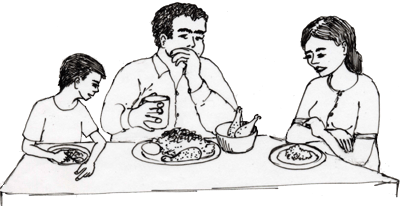All cultures have various traditional beliefs and customs concerning food. Sometimes people eat special foods at festivals. Some foods may be avoided on particular days. Foods that are avoided in one culture may be valued in another. Some foods may be forbidden completely in certain cultures or religious groups but enjoyed in others.
Most of these beliefs have little impact on nutrition but there are some that have a large impact. For example, in many cultures pregnant or nursing women are not supposed to eat eggs. However, eggs are a very nutritious food. Children may also be prevented from eating foods that would be of real nutritional benefit.
Changing unhelpful food customs is difficult to do and can take a lot of time.
Discussion
- What customs, traditions and taboos in our own culture limit the variety of foods eaten?
- Are any of them unhelpful and damaging to good nutrition?
- Are any kinds of foods considered bad for pregnant or breast-feeding mothers? Why is this? Are our answers based on our traditions or on good nutritional teaching?
- Should some of these taboos be challenged and if so, how could this be done sensitively?
- Eggs have a very high nutritional value. Are there customs which do not allow young children and pregnant and breast-feeding mothers to eat eggs? How could they be allowed to eat eggs? How can unhelpful practices be changed?
- What customs do we have that may prevent young children from eating a nutritious diet?








